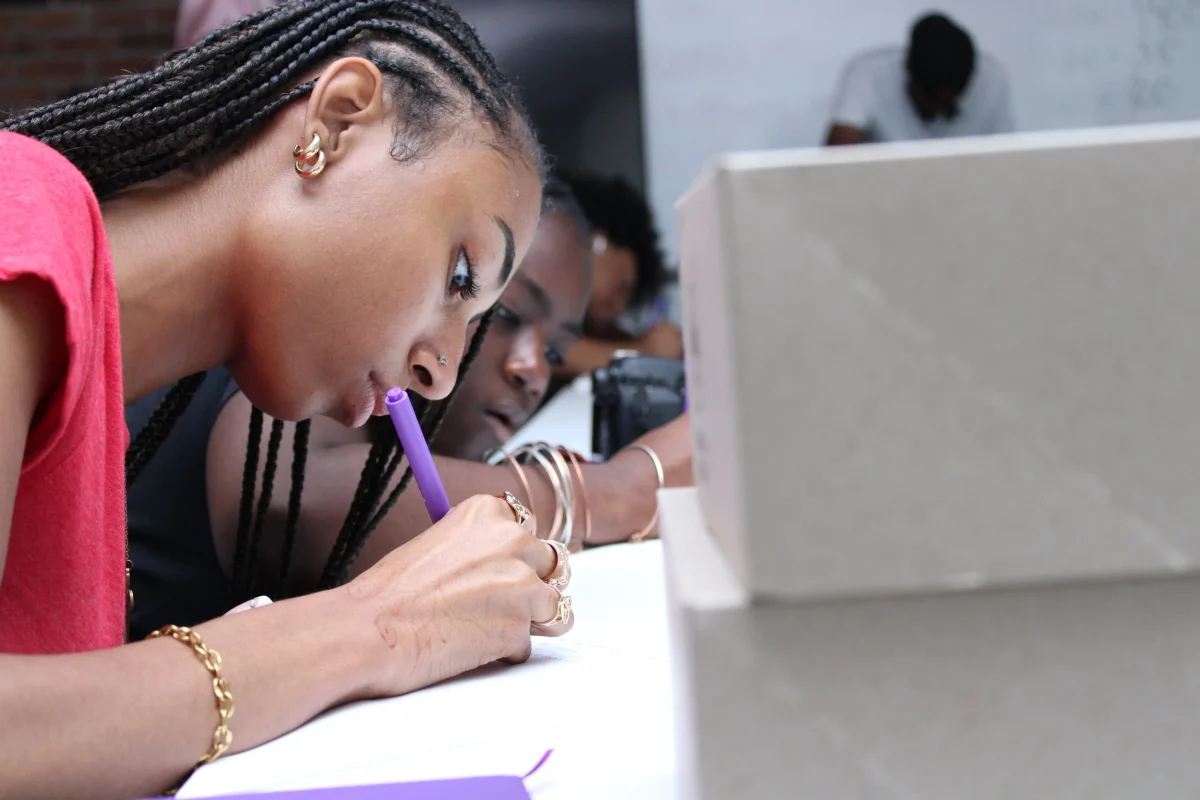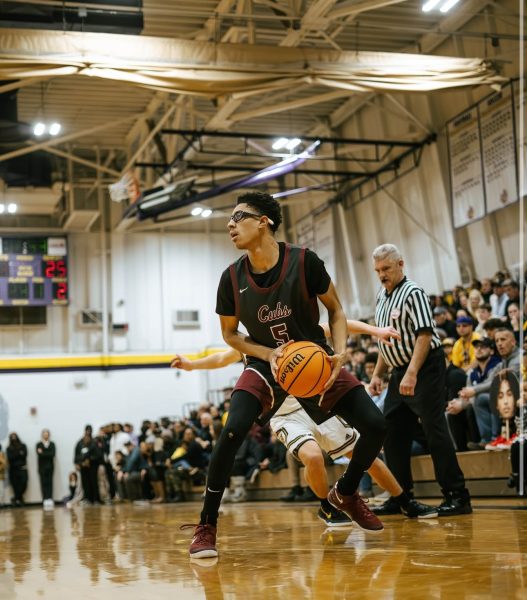If Blair Ramsey could advise his overworked teenage self, he’d tell himself:
“You’re not going to be perfect. Nobody’s perfect.”
Ramsey is a director of admissions and retention coordinator at the University of Detroit Jesuit High School and Academy, an all-male college preparatory academy on Detroit’s west side. There, he observes a range of how young men cope with burnout. In an all-male environment, some young men don’t feel comfortable coming to adults to talk about their feelings.
“We’re in an all-boy environment, so it’s a little bit more difficult for boys or young men to express themselves, be open about how they’re feeling,” Ramsey said. “Every kid, every adult has something going on in their lives. And especially for kids, it’s important to have somebody to talk to and express how you feel and not feel like you’re being judged.”
From late-night study sessions to maintaining a social life and pushing themselves to be the best they can be, young students at schools like the University of Detroit Jesuit often feel overwhelmed by pressure. While many may appear successful, many quietly suffer from feelings of being overwhelmed and exhausted.
How Burnout Impacts Academics and Mental Health
Burnout occurs when one’s emotional, mental, and physical state has been depleted, typically caused by overworking, excessive stress, and being in constant high-pressure situations. Students often face this challenge when trying to juggle academic standards, extracurricular activities, and maintaining a solid social life, all while getting enough rest. Almost every aspect of a student’s life is affected by this epidemic, from grades in school to mental health and relationships. When students feel burnt out, they face social, cognitive, emotional, and physical challenges.
Academic Impacts
Burnout can quickly turn a student from a 4.0 honor roll kid into a barely passing student. When feeling burnt out, students start to miss deadlines and lose motivation, which causes grades to slip. Students who have excelled throughout previous years can struggle when getting to high school because it can be overwhelming. School can start to feel more like a chore than a place of growth.
“Especially during junior year, like I had a lot of absences because of the mental capacity it took,” said Jaeli Vélez, a rising senior at University Liggett School. Jaeli’s experience is one that many high-achieving students can relate to, pushing themselves so hard academically that it starts to take a toll on their physical and emotional well-being. For students like her, burnout doesn’t always look like giving up; sometimes it shows up in quiet withdrawals, missed days, or just running on empty while pretending everything’s fine.
Physical Wear and Tear
Burnout isn’t just mental; it wears students down physically. When students are constantly on the go, their bodies will naturally react to the impact. Burnout often leads to chronic fatigue, tiredness that can’t be fixed. Late-night study sessions and full school days can throw off sleep schedules and drain energy.
“I’ve pulled a couple [all-nighters], especially for projects,” Vélez said.
The constant demand to keep pushing leaves little time for rest and recovery, turning physical health into an afterthought.
Mental Erosion
Mental burnout can make students feel anxious and depressed. Students’ confidence can potentially drop, which lets negative thoughts creep in, making it that much harder to gain positive energy. This emotional strain not only affects how students see themselves but also how they interact with others daily. Over time, this mental strain takes a serious toll on the well-being of a person.
Dr. Tanya Sims, a clinical therapist with 19 years of experience, explained, “Burnout is excessive tiredness, excessive worry, sporadic behavior, not being able to make decisions or focus. It messes with your mental and physical health, leading to chronic depression, self-isolation, and anxiety.”
Social Influence
Burnout causes us to pull ourselves away from the crowd. When feeling burnt out, it is hard to keep up with your peers because you feel too drained to connect with others, which causes the feeling of isolation to grow wider. Even asking for help might feel too overwhelming, leading to students suffering in silence.
Dr. Sims noted, “The most critical impact is self-isolation. Students question their place in the world, lose their appetite, can’t sleep, and neglect basic self-care.”
Constant Studying
Society equates academic success with how successful you are outside of school. When students compare themselves to stats and other students, they can be hurting themselves without even knowing it. Some students chase a number their whole four years of high school. GPA, SAT, and ACT scores do not define you as a person. Students sometimes push their education to the forefront of their lives. Most of the time, this is an amazing thing, highlighting how students have a priority of education and their future. At the same time, some need a break. Sitting in your room studying night in and night out can be beneficial, but when are teenagers going to be allowed to be teenagers?
Hidden Cost of Chasing Success
Outside of the classroom, students are expected to serve their community and participate in extracurricular activities. While these experiences can be rewarding and help students grow, they can also get overwhelming and just add to a pile on top of academics. From student government to clubs, the constant pressure to build a strong résumé can leave students with little time for themselves. What’s meant to be enriching becomes exhausting, turning passions into obligations and leaving students burnt out from trying to do it all.
Maintaining Social Connections
High school is a very important time where friendships are supposed to blossom and thrive, but burnout can make relationships feel like another task on the to-do list. From homework and projects to sports and clubs, students often have little energy left for friends and family. This lack of time can cause a disconnection with family and friends. When socializing starts to feel like a burden, students may remove themselves from support systems that could help them with their stress.
College Apps and Scholarships
As juniors and seniors approach graduation, the pressure of college applications and scholarships rises. Students are expected to keep their grades up while filling out their college application, which can be another homework assignment. The fear of rejection can also add to the pressures of the college application, creating a point of comparison and anxiety. The college process should feel like a road to new doors, but instead can feel like a race that leaves students emotionally and mentally exhausted before arriving on campus.
Athletic Ambition or Overload
For student athletes, balancing academics and sports can be a daily struggle. Practice, games, and workouts consume hours that can be used for other things. Some athletes know that the price for a good athletic life is a social life. Coaches frequently hold mandatory summer workouts, weight training, or conditioning sessions that extend past the school year, leaving little time for rest or just summer. On top of that, many athletes who want to play at the next level participate in AAU, which is a time when college coaches get another opportunity to see potential college athletes. AAU requires long travel times, extra practices, and hefty commitment. While these can open up doors to scholarships, the nonstop pressure to perform and improve can push a student athlete toward mental, emotional, and physical burnout. That leaves people like Ramsey to find ways to help students prioritize finding a balance in their lives.
Ramsey has been there himself. Blair Ramsey, a 2009 University of Detroit Jesuit graduate, has seen the ups and downs of a high school student-athlete.
“I know what some of the guys like yourself are doing, and y’all do a lot…I just know what it entails.”
As a dedicated athlete in love with the game of basketball, Ramsey didn’t know he was burnt out in the high-energy moments of his high school career. From workouts with U of D to AAU with Reach Legends, Ramsey didn’t know how to cope with his burnout. Fortunately, Ramsey was able to later talk to a sports psychologist, which helped him.
“When I was younger, honestly, I didn’t have one. I don’t think you really think about it. Looking back on it, I know I was burnt out at times. I didn’t really have any good coping skills when I was in high school. I went to therapy a few times. I worked with a sports psychologist a few times in high school, which helped me,” Ramsey said. “But as I got older, I started to get into meditation, practicing mindfulness. Just sitting and praying, those types of things helped me calm my mind, calm my body, and quiet everything around me when I was so stressed out or felt overworked.”
As Ramsey got older, he learned more about mental health, being able to create ways to clear his mind that are unique to him and his journey. Kids must go through their mental health journey with someone they can lean on. They also need that independence so that they can find ways that work for them and their journey.
Closing
As college admissions grow to be more competitive, and as expectations from families, teachers, and peers increase, students are pushed to juggle academics, school sports, extracurriculars, jobs, and social lives with little time to breathe. What begins as ambition can quickly turn into exhaustion, anxiety, and even breakdowns. The no days off mindset becomes so normalized that many students don’t realize they’re slipping until they’ve already hit their limit. What are students truly willing to risk to obtain an accolade, a title, or a scholarship? For some, it’s their sleep, social life, or physical health. For others, it’s their peace of mind, confidence, and mental stability. Dr. Sims warns that this kind of overextension can become a dangerous cycle, where students internalize the belief that suffering is just part of the process, a necessary sacrifice for success. In reality, when students are constantly running on fumes, the very goals they’re chasing start to feel hollow. The pressure to be perfect can rob them of the joy that first inspired their ambition in the first place. “Everything that you’re going through, you’re meant to go through,” said Blair Ramsey, encouraging students to find meaning even in their most difficult moments. “Be your authentic self, it’s okay not to be perfect,” added Dr. Sims. “Love and validate yourself first. Everyone is unique, and it’s vital to live as your own original.” Junior Jaeli Vélez advises her peers to stay focused and seek help when needed: “If you’re struggling in classes, definitely get a tutor because it really helps… try your hardest to stay on top of things. If you don’t, it might come back to bite you.” Their words serve as a reminder that while burnout may feel like a requirement for success, it doesn’t have to be. There’s power in slowing down, asking for help, and giving yourself the grace to grow at your own pace.
My Personal Experience: Burnout Isn’t a Badge of Honor
Over the past three years, it would seem like I have had a hectic life. Three schools in three years is not ideal for anyone, but this is the path God set for me. Each year has been filled with new lessons and experiences that I have used to help myself grow into a better person. Going from University Liggett School to Brother Rice to the University of Detroit Jesuit has not been easy. My schedule, both inside and outside the classroom, has changed drastically, which has taught me how to adjust on the fly. With homework loads changing each year, I have had to learn how to manage my time so that I make sure I get my work done thoroughly while still having time to myself.
Life on the court has also changed a lot. At Liggett, I was one of the very few people who wanted to play college sports. This didn’t help me get better because some of my teammates weren’t pushing themselves to be better, ultimately making me better. This sparked a conversation with my parents as to whether to transfer or not. As a family, we chose to transfer to Brother Rice. Unfortunately, I had to sit out due to the transfer rule, which motivated me to stay in the gym and work on my game. At Brother Rice, I was reintroduced to early morning workouts.
From that point on, I made sure I was first at every 6 am workout. With 6 am workouts and practice after school, I was tired, but I still had to complete homework and other assignments. Not being able to play also took a mental toll on me. Sitting on the sideline watching everyone on the court having fun bothered me. Going through this exhausted me mentally, while also being physically tired from having two workouts per day, school, and still trying to complete homework. I was experiencing burnout, but at the time, I didn’t recognize it. I thought this was just what it took to become a college athlete. I convinced myself that exhaustion was a part of the grind.
Looking back, I can see how deep into burnout I really was. I was constantly running on fumes, telling myself that it was normal. Burnout became part of my routine, early mornings, long school days, late nights of homework, and no real time to rest. I experienced burnout, trying to keep up with everything while never really taking personal time for myself because I was in the gym and having to complete assignments and study.
At one point, I didn’t even notice how much I was pushing myself beyond my limits because I equated suffering with success. I had to realize that my time is just as important as the time I spend on the court. After leaving Rice and transferring to the University of Detroit Jesuit, the morning workouts didn’t stop. As I matured, I understood how much work I had to put into my craft to play at the next level. The homework intensity ramped up at a steep incline, so I had to put more time into my schoolwork. As my school load increased, the basketball aspect of my life did too. From early morning workouts, school, and practice, I knew I had to make changes or I would fall deeper into burnout. I had to take the necessary steps to work on my mental health.
Now, I’m more aware of the signs of burnout and how important balance is. The next step in maturity for me was to make a plan for myself to make sure I take the necessary time to focus on myself.







